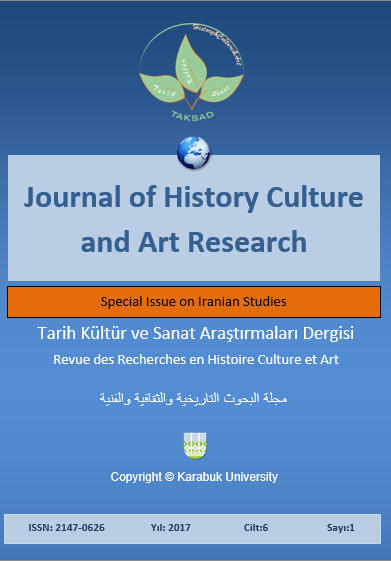The Impact of Cognition on Memorizing Words in Learners of English as a Foreign Language
DOI:
https://doi.org/10.7596/taksad.v6i1.741Keywords:
Learning, Metacognition, Learning strategy, Motivation.Abstract
In today's world, English language proficiency is necessary for access to new scientific findings in different fields. It is worth mentioning that more utilization of memorizing words in the process of English language learning help English teachers in facilitating language teaching. During English language learning and memorizing of words, the factor of recognition is more important than talent so, this paper aims to investigate the effect of perception on the memorizing words in English language learners. This study performed by descriptive-analysis method. Results showed that learning and use of self-regulated strategies help learners in two “result-based” and “process-based” orientations during writing in foreign language. We can say that knowledge about the kind of relation between the motivational believes and language learning strategies is important.
References
Aghahosseini, T., Sobhaninejad, M. & Abedi, A. (2006). A Study of Influential Factors in High School Management Effectiveness from Teachers and Principles Point of View. Bimonthly Journal of behavior Scholar, 13(18), 57-76.
Anglin, J. M., Miller, G. A. & Wakefield, P. C. (1993). Vocabulary development: A Morphological Analysis. Monographs of the Society for Research in Child Development, i-186. DOI: 10.2307/1166112
Bialystok, E. (1983). Inferencing: Testing the “hypothesis-testing” hypothesis. Classroom oriented research in second language acquisition, 104-123.
Chamot, A. U. (2005). Language learning strategy instruction: Current issues and research. Annual review of applied linguistics, 25, 112-130.
DOI: 10.1017/s0267190505000061
Ellis, R. (2003). Task-Based Language Learning and Teaching. Oxford University Press.
Ghandehari, F. (2004). Etymology and Word Formation Knowledge and its Effect on Learning and Development of English Language Words, No. 363/1/487, Research Deputy of University of Tehran.
Hoover-Dempsey, K. V., Battiato, A. C., Walker, J. M., Reed, R. P., DeJong, J. M. & Jones, K. P. (2001). Parental Involvement in Homework. Educational Psychologist, 36(3), 195-209. DOI; 10.1207/s15326985ep3603_5
Kadivar, P. (2010). Educational Psychology, Organization of Study and Development of Humanitarian Books of Universities (SAMT), Center of Research and Development of Humanitarian Sciences, Tehran.
Khalkhali, V., Sharifi, R. & Nikyar, A. (2013). Students’ Intentions to Persist in, Versus Dropout of High School: What Self-Determined Motivation Tells Us about It. International Online Journal of Educational Sciences, 5(2), 282-290.
O'Grady, W., Dobrovolsky, M. & Katamba, F. (Eds.). (1997). Contemporary Linguistics. St. Martin's.
O'Malley, J. M., Chamot, A. U., Stewner‐Manzanares, G., Kupper, L. & Russo, R. P. (1985). Learning Strategies Used by Beginning and Intermediate ESL Students. Language Learning, 35(1), 21-46. DOI: 10.1111/j.1467-1770.1985.tb01013.x
Pintrich, P. R. & De Groot, E. V. (1990). Motivational and Self-Regulated Learning Components of Classroom Academic Performance. Journal of Educational Psychology, 82(1), 33-40. DOI: 10.1037//0022-0663.82.1.33
Pishghadam, R. (2008). Relation Between Language Learning Strategies and Gender and the Major Strategies of English Language Learning for Iranian Learners, Humanitarian Sciences and Literature Faculty of Tabriz University, No.208, 24-25
Rahmani, Degharuni, V. (2013). Critical Approach to the Communicational Strategies in Teaching the Second Language, Foreign Language Teaching Journal, No.106, 4
Rovio, J. (2002). Motivation and Excitement, Translated by Yahya Seyyedmohamadi, Tehran: Nashre virayesh.
Rubenstein, R. N. (2001). Mental Mathematics Beyond the Middle School: Why? What? How? The Mathematics Teacher, 94(6), 442-446.
Seif, A. (2003). Educational Psychology, Learning and Teaching Psychology, (8th Ed.). Tehran: Agah Press.
Sejnost, R. L. & Thiese, S. (2007). Reading and Writing Across Content Areas. Recording for the Blind & Dyslexic. Corwin Press, a Sage Publications Co. DOI:10.4135/9781483329499
Sheikholeslami, R. & Khayer, M. (2006). Investigation about Motivational Beliefs and Use of English Language Learning Strategies among Students, Quarterly Journal of Psychology, 10(1), 22-33.
Shokohi Yekta, M., Akbari Zardkhane, S., Parand, A. & Puran, F. (2012). Enhancement of Interaction between Children and Their Parents Using New Methods of Childbearing, Journal of Psychological Models and Methods, 2(10), 1-13.
Stevens, R. J., Slavin, R. E. & Farnish, A. M. (1991). The Effects of Cooperative Learning and Direct Instruction in Reading Comprehension Strategies on Main Idea Identification. Journal of Educational Psychology, 83(1), 8. DOI: 10.1037//0022-0663.83.1.8
Wang, M. C., Haertel, G. D. & Walberg, H. J. (1990). What influences learning? A Content Analysis of Review Literature. The Journal of Educational Research, 84(1), 30-43. DOI: 10.1080/00220671.1990.10885988
Williams, J., Inscoe, R. & Tasker, T. (1997). Communication Strategies in an Interactional Context: The Mutual Achievement of Comprehension. Communication Strategies: Psycholinguistic and Sociolinguistic Perspectives, London: Longman. pp: 304-322.
Windsor, J. (1994). Children's Comprehension and Production of Derivational Suffixes. Journal of Speech, Language, and Hearing Research, 37(2), 408-417. DOI; 10.1044/jshr.3702.408
Windsor, J. & Hwang, M. (1999). Derivational Suffix Productivity for Students with and without Language-Learning Disabilities. Journal of Speech, Language, and Hearing Research, 42(1), 220-230. DOI: 10.1044/jslhr.4201.220
Zimmerman, B. J. (1995). Self-Regulation Involves more than Metacognition: A Social Cognitive Perspective. Educational Psychologist, 30(4), 217–221 DOI: 10.1207/s15326985ep3004_8
Downloads
Published
How to Cite
Issue
Section
License
All papers licensed under Creative Commons 4.0 CC-BY.- Share — copy and redistribute the material in any medium or format
- Adapt — remix, transform, and build upon the material for any purpose, even commercially.
Under the following terms:
Attribution — You must give appropriate credit, provide a link to the license, and indicate if changes were made. You may do so in any reasonable manner, but not in any way that suggests the licensor endorses you or your use.
- No additional restrictions — You may not apply legal terms or technological measures that legally restrict others from doing anything the license permits.







